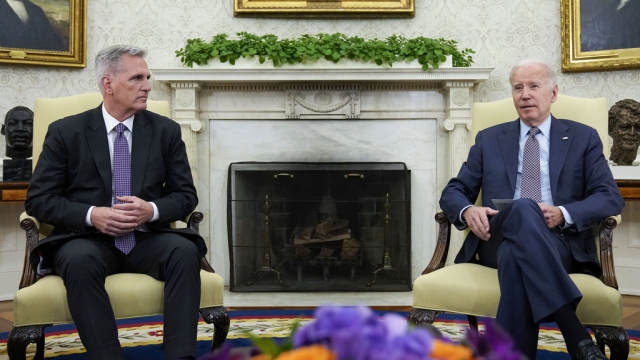President Joe Biden confirmed on Sunday that he reached an agreement with House Speaker Kevin McCarthy to extend the debt ceiling for two years.
Now, he hopes Congress will approve the compromise.
“The speaker made clear from the start that the only way forward was a bipartisan agreement,” Biden said. “That agreement now goes to the United States House and to the Senate. I strongly urge both chambers to pass that agreement.”
The full 99-page bill was released to the public Sunday evening.
Both Biden and McCarthy claimed victories. The White House sees the agreement as protecting key priorities from Republican proposals. Republicans view this as reigning in spending by the administration.
Biden said the agreement, which included cuts to some programs, preserves funding to Medicare, Social Security and veterans, although McCarthy didn’t imply funding for those programs would ever be cut.
McCarthy complained about how long it took to enter into negotiations with the White House. But Biden said he believes McCarthy negotiated in good faith.
“He kept his word and he said what he would do,” Biden said.
McCarthy acknowledged he did not get everything he wanted, but was pleased with the deal.
"I think people will look back and say, 'Well I didn't get exactly what I wanted.' But there's something in here, that it shouldn't be about you, it should be about America. America believes we have spent too much, so this spends less,” he said.
McCarthy told reporters he believes a majority of Republicans in the House will vote in favor.
SEE MORE: Debt ceiling: What's in, what's out of the deal to avert US default
One major win for the White House was preserving the status quo for Medicaid recipients. McCarthy’s plan called on Medicaid recipients ages 19-55 to perform 80 hours of “community engagement” a month, such as work or volunteer requirements. A White House source confirmed there will be no changes to Medicaid.
According to background information from a White House source, the deal holds non-defense spending roughly flat in 2024, increasing it by only 1% in 2024.
The Biden Administration also was pleased that Republicans would not attempt to overhaul changes to new rules to lower payments for student loans via income-driven repayments.
In addition to cutting discretionary spending, McCarthy scored a win by requiring the executive branch to find "dollar-for-dollar savings" when implementing costly rules and regulations.
The bill also repurposes $10 billion in funding for the Internal Revenue Service out of $80 billion previously allocated to it over the next 10 years.
Work requirements to receive Supplemental Nutrition Assistance Program benefits will go up to age 54 for adults without children, but exemptions will be made for some, including veterans and the homeless.
“The Fiscal Responsibility Act does what is responsible for our children, what is possible in divided government, and what is required by our principles and promises. Only because of Republicans’ resolve did we achieve this transformative change to how Washington operates,” McCarthy said.
Reporting from Scripps News White House reporter Haley Bull was used in this report.
Trending stories at Scrippsnews.com




